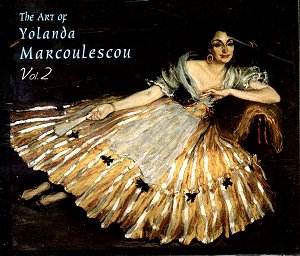
The Art of Yolanda Marcoulescou-Stern (soprano)
Volume 2
Gaetano DONIZETTI
(1797-1828)
Lindi di Chamonix - Ah tardai troppo
La Figlia Del Regimento – Deciso e dunque
Gioacchino ROSSINI
(1792-1868)
William Tell – Selva opaca
Ottorino RESPIGHI
(1879-1970)
5 Liriche >
E se un giorno tornasse >
Gianluca TOCCHI (1901-?)
Suite; Canti di strapaese >
Serenata
Stornello
In riva al fiume
Gian Francesco MALIPIERO
(1882-1973)
Cinq melodies >
Chanson Morave
Les yeux couleur du temps
Pégase
Ariette
L’archet
CIMARA
Three Songs >
Stornello
Stornellata marinara
Vecchia chitarra
Edward MACDOWELL (1860-1908)
Bitte
Geistliches Wiegenlied
Idylle
Charles IVES (1874-1954)
Weil’ auf mir
Ich grolle nicht
Die alte Mutter
Ilmenau
Feldeinsamkeit
John Alden CARPENTER (1876-1951)
Prison
Il pleure dans mon Coeur
John DOWNEY
Qu’en avez-vous fait? #
Virgil THOMSON (1896–1989)
Le berceau de Gertrude Stein
Charles T GRIFFES (1884-1920)
Auf geheimen Waldespfade (Schiflied)
Gian Carlo MENOTTI (b
1911)
Canti Della Lontananza
Paul BOWLES (1910-1999)
Cancioncilla Sevillana
Media Luna
Balada Amarilla
Murio al Amanecer
Don DRAGANSKI
The Bestiary – Six Riddles +
(Herman?) BERLINSKI
Psalm XXIII +
Joaquin RODRIGO (1901
– 1999)
Two Songs
Verde, verderol +
Pajaro del agua +
Virgilio MORTARI (1902-
1993)
Canzone (Vocalise) +
Johannes BRAHMS (1833-1897)
Geheimnis
Parole
Dein blaues Auge
Salamander
Mädchenlied
Immer leider wird mein Schlummer
Wir wandelten
Der Frühling
Das Mädchen spricht
Die Mainacht
Vergebliches Ständchen
Wie Melodien zieht es mir
Bei dir sind meine Gedanken
Schön war, das ich dir weihte
Ständchen
Nachtigall
Spanisches Lied
Meine Liebe ist grün
Treue liebe
O liebliche Wangren
Serenade
Der Jäger
Von ewiger Liebe
![]() Yolanda Marcoulescou-Stern (soprano)
Yolanda Marcoulescou-Stern (soprano)
Jeffrey Peterson (piano) unless otherwise noted
Dalton Baldwin (piano) >
John Downey (piano) #
Robert Goodberg (flute) +
Recorded c1970s with the exception of the Opera
Excerpts, pre 1968
![]() GASPARO GG3-1005 [3 CDs 192.24]
GASPARO GG3-1005 [3 CDs 192.24]
purchase through CCNow